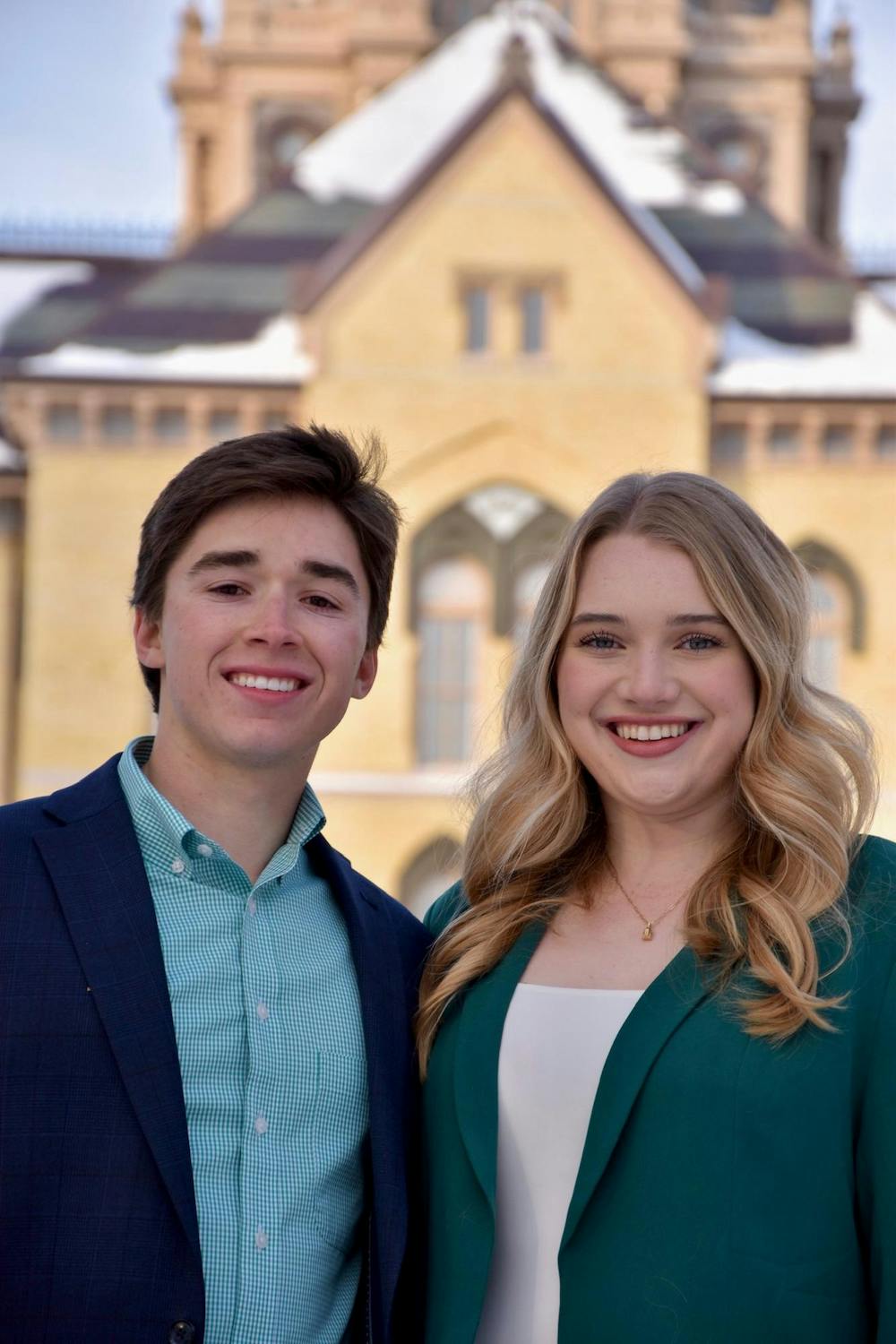If you ask junior Dawson Kiser and sophomore Maeve Miller why they are running for student body president and vice-president, respectively, their answer is simple.
They love Notre Dame and they want to give back to the community the best way they know how.
Originally from Tampa, Florida, Kiser is majoring in management consulting with minors in theology and entrepreneurship. Miller, also from the Tampa area, is studying sociology and Spanish with a minor in accountancy. Both bring extensive student government experience to the fore.
Kiser was Dillon Hall president during 2022-23 and now serves as vice president for the junior class. He touts bringing back the Dillon pep rally as his greatest achievement in student government.
Miller is currently serving as McGlinn Hall senator, serving the largest women’s dorm on campus. She also works in the Office of Student Affairs as a team lead for the Beyond Welcome Weekend initiative.
Kiser and Miller brought all that experience to put together an extensive 15-page platform that touches on everything from artificial intelligence to campus dining.
Student life
Kiser and Miller say their ticket’s signature policy is their proposal for a Notre Dame Artificial Intelligence (ND AI) program.
Kiser and Miller both highlighted a widespread ignorance of a wealth of resources that already exist for students on campus. They also pointed to a barrier to access when relying on students to find sometimes-hidden webpages and resources that the University has online.
To alleviate this, they propose working with the Office of Information Technology (OIT) to create an AI program for students and the wider University community. They say it’s a realistic proposal and they believe the administration agrees.
Their platform puts it succinctly: “A student would be able to ask ND AI, ‘How do I schedule an appointment at the University Counseling Center?’ and ND AI would generate steps on scheduling an appointment and provide a link to the UCC website.”
OIT currently has a 13-member AI automation working group that is exploring the possibility of something similar to what the Kiser-Miller campaign is proposing.
The campaign has a bevy of other campus life proposals. Notably, they proposed a water quality initiative to improve the drinking water in campus buildings like DeBartolo Hall, citing common complaints about the quality of “DeBart water.”
When it comes to faith, Kiser and Miller emphasized increasing accessibility and engagement with religious services both on and off campus. They said this way they could cater both to Catholic and non-Catholic students with equal vigor. This ranges from initiatives like Mass response cards in residence hall chapels and the Basilica to subsidizing rides for off-campus religious events.
Campus improvements
The Kiser-Miller campaign also champions a number of proposals to concretely improve campus services and facilities.
Kiser highlighted residence hall laundry facilities as one of the campaign’s most pressing concerns. He said the ticket received extensive feedback pointing to dissatisfaction with those facilities in particular.
To address this, the campaign pledges to work with the Office of Residential Life to improve the washer/dryer-to-student ratio, which the campaign says varies substantially from one residence hall to the next.
The campaign’s platform also features an extensive list of dining hall improvement initiatives. Among these are improved dining hall meals for people with dietary restrictions, like allergies, as well as revamped Grab-n-Go options.
They also want to implement what they call “community tables.” The idea behind these is to create a designated space in dining halls where students can signal their willingness to meet someone new and make new friends on campus.
Further campus improvements include updated athletic equipment for the Rockne Memorial Gym and new sustainability initiatives.
The platform also proposes a number of policies aimed at increasing Notre Dame’s connection to South Bend, most notably through service projects in the community.
Diversity and representation
The Kiser-Miller campaign proposed a variety of policies on issues of race, Title IX, disability advocacy and more.
Miller particularly highlighted the campaign’s pledge to improve incident reporting for students of color. The platform includes a proposal to use anonymous feedback collected through resident assistants to offer students a more informal reporting mechanism than the active Speak Up reporting process.
The platform also places an emphasis on expanding Title IX efforts while improving awareness of current resources like Callisto. Notably, they propose the integration of a sexual assault prevention program into Welcome Weekend for freshmen and into residence halls and beyond.
Another signature diversity proposal is the “Building Allies” program aimed at serving Notre Dame’s LGBTQ+ community. This proposal, along with the expansion of Pridefest into a week-long event, forms the core of the campaign’s LGBTQ+ policies. Miller said it was all done with the goal of increasing understanding between members of the community and the Notre Dame student body at large.
Throughout the campaign, Kiser and Miller have emphasized their care for the student body and their drive to improve the lives of their fellow students, no matter the hurdles.
“We care about Notre Dame students and want to serve them to the best of our ability,” Kiser said. “If [a particular policy] goes out the window, we're just going to come back even harder … we have the experience to know how to get these things done and know how to make change. That's what we've done in our time at Notre Dame so far, and I have no doubt in my mind that we're going to continue to do that.”










